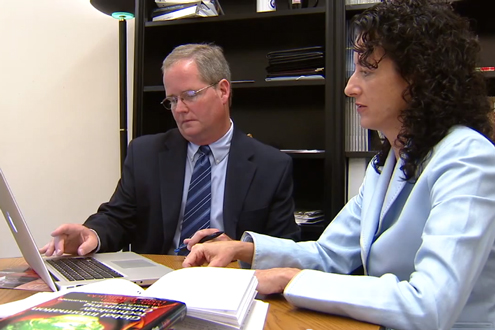
Joseph Rottman, associate professor of information systems at UMSL, and Mary Lacity, Curators’ Professor of Information Systems at UMSL, co-wrote a new book on rural outsourcing. The book, “Emerging ITO and BPO Markets: Rural Sourcing and Impact Sourcing,” was published by IEEE Computer Society.
When many Americans hear the word outsourcing, thoughts of shipping jobs overseas enter their heads. But a new trend in outsourcing is gaining momentum. Rural outsourcing is the idea of bringing jobs to rural areas throughout the United States.
The topic of rural outsourcing in Missouri was the focus of a recent International Association of Outsourcing Professional’s Midwest Chapter meeting hosted by the University of Missouri–St. Louis.
Mary Lacity, Curators’ Professor of Information Systems at UMSL and member of the IAOP Midwest Chapter’s leadership team, is an expert on outsourcing and co-wrote the new book “Emerging ITO and BPO Markets: Rural Sourcing and Impact Sourcing.” The book, published by IEEE Computer Society, was co-written by Joseph Rottman, associate professor of information systems at UMSL, and Erran Carmel, professor of information technology at American University in Washington, D.C.
“What started as a way to get people back to work in small rural towns has evolved into an industry in its own right, one that leverages the motivation of a previously passed-over rural work force to help American companies better compete in a global marketplace,” Lacity said. “Rural outsourcing is now one component of our nation’s onshoring or insourcing efforts to bring back jobs to America.”
“Emerging ITO and BPO Markets: Rural Sourcing and Impact Sourcing” explores two overlapping niche sourcing market: rural sourcing and impact sourcing. Rural sourcing is about the location and impact sourcing focuses on providing opportunities for employment where otherwise there would be none.
“Rural sourcing allows U.S.-based clients to have a support or development team in the same time zone that shares the same culture, language and experiences as the client firm,” Rottman said. “Often, in global sourcing engagements, cultural and time zone differences are challenges that must be mitigated for the relationship to mature and for value to be achieved. The process of team building and knowledge transfer is considerable easier and faster with a rural sourcing model.”
Lacity, Rottman and Carmel looked at various examples of rural outsourcing while researching for their book. One of those examples was a Missouri company started by Shane Mayes. The company, Onshore Outsourcing, employs 120 people in two Missouri locations, Macon and Joplin. Onshore Outsourcing started in 2005 and helps companies with software development and support. Mayes has grown the company from a startup to a multimillion-dollar business with two rural technology centers as well as a support office in UMSL’s incubator, Innovative Technology Enterprises.
Lacity said outsourcing is important, both throughout the United States and the world.
“Rural outsourcing is just another component that makes the market stronger,” she said.
Lacity said the idea behind rural outsourcing is to bring good jobs to areas with little options.
“It’s about job creating within the United States, lowering the the cost of it so that larger companies don’t think they have to leave America,” she said. “Impact sourcing is a work-force strategy, taking marginalized populations who don’t have strong job opportunities, training them and employing them to do ITO or BPO work.”
In Macon while researching for “Emerging ITO and BPO Markets,” Lacity and Rottman spoke with several people whose lives have been changed because of rural outsourcing.
“We met men and women who were cashiers at Walmart or the grocery store, who had no options for job growth there, but were tied to the community for family reasons so this is really transformative for what rural outsourcing companies do in their communities,” she said. “It really is a win-win.”
Rottman said he was surprised by how invested people were in the idea of rural outsourcing.
“Many of the people we interviewed showed excitement and zeal for the model, their projects and their new careers,” he said. “Often in our interviews for other projects, the respondents may be reticent to share their stories. However, in this case, the customers, the clients and the employees on both sides of the partnerships were eager to share their stories and experiences. Rural outsourcing will continue to be an important, but very small niche in the global outsourcing landscape for the foreseeable future. The growth rates are impressive and the passion of both the providers and clients will help to increase the visibility and effectiveness of this new sourcing option.”
“Emerging ITO and BPO Markets: Rural Sourcing and Impact Sourcing” is available at Amazon.














